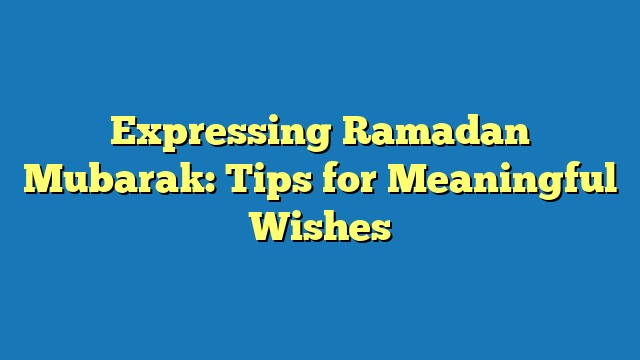Ramadan Mubarak wishes messages are special words or phrases used to express well wishes during the month of Ramadan, a holy month observed by Muslims worldwide. For instance, “May this Ramadan bring you blessings and peace.”
Exchanging Ramadan Mubarak wishes is a significant way to celebrate and connect with the Muslim community during this sacred time. It promotes unity, strengthens bonds, and conveys the spirit of Ramadan. Historically, the concept of exchanging Ramadan greetings can be traced back to the early days of Islam, when the Prophet Muhammad encouraged his followers to greet each other with kind words during the month.
This article delves into the various aspects of Ramadan Mubarak wishes messages, including their etiquette, cultural significance, and impact on fostering a sense of community among Muslims.
Ramadan Mubarak Wishes Messages
Ramadan Mubarak wishes messages are an essential aspect of the holy month of Ramadan, conveying well wishes and strengthening bonds among Muslims.
- Cultural: Rooted in Islamic tradition and cultural practices.
- Spiritual: Expressing gratitude and seeking blessings during Ramadan.
- Social: Fostering a sense of community and connection.
- Religious: Adhering to the Sunnah of the Prophet Muhammad.
- Communal: Shared within families, friends, and the Muslim community.
- Verbal: Greetings exchanged in person or over the phone.
- Written: Messages sent through cards, letters, or social media.
- Symbolic: Conveying goodwill and well wishes for a blessed Ramadan.
These aspects highlight the multifaceted nature of Ramadan Mubarak wishes messages, reflecting their cultural, spiritual, social, religious, and linguistic significance. They serve as a means to connect with loved ones, strengthen community bonds, and commemorate the essence of Ramadan.
Cultural
Ramadan Mubarak wishes messages are deeply rooted in Islamic tradition and cultural practices. The act of exchanging well wishes during Ramadan is a way for Muslims to express their joy, gratitude, and blessings during this holy month.
The cultural significance of Ramadan Mubarak wishes messages is evident in the way they are shared and received. For example, in many Muslim cultures, it is customary to greet each other with “Ramadan Mubarak” (Arabic for “Blessed Ramadan”) upon meeting during the month. This greeting is often accompanied by a warm handshake or embrace, conveying a sense of community and shared celebration.
Moreover, the content of Ramadan Mubarak wishes messages often reflects Islamic values and beliefs. For instance, many messages include prayers for peace, unity, and forgiveness. These messages serve as a reminder of the spiritual significance of Ramadan, a time for reflection, self-improvement, and increased devotion.
In conclusion, the cultural aspect of Ramadan Mubarak wishes messages is a key component of their significance. These messages are deeply rooted in Islamic tradition and cultural practices, reflecting the values and beliefs of the Muslim community. They serve as a way to connect with loved ones, strengthen community bonds, and commemorate the essence of Ramadan.
Spiritual
Ramadan Mubarak wishes messages are imbued with spiritual significance, expressing gratitude and seeking blessings during the holy month of Ramadan. This spiritual aspect is deeply intertwined with the essence of Ramadan, a time for reflection, self-improvement, and increased devotion.
Gratitude is a central theme in Ramadan Mubarak wishes messages. Muslims express their appreciation for the blessings they have received, including the opportunity to observe Ramadan, the guidance of Allah, and the support of loved ones. These messages often include prayers for continued blessings, both material and spiritual, throughout the month and beyond.
Seeking blessings is another important aspect of Ramadan Mubarak wishes messages. Muslims believe that Ramadan is a time when prayers are more likely to be answered and blessings are more readily bestowed. Therefore, Ramadan Mubarak wishes messages often include prayers for peace, unity, forgiveness, and guidance. By sending these messages, Muslims are not only expressing well wishes but also seeking blessings for themselves and others.
In conclusion, the spiritual aspect of Ramadan Mubarak wishes messages is a key component of their significance. These messages serve as a means to express gratitude for blessings received and to seek further blessings during the holy month of Ramadan. They reflect the deep spiritual nature of Ramadan and highlight the importance of seeking Allah’s favor and blessings in all aspects of life.
Social
Within the realm of Ramadan Mubarak wishes messages, the social aspect plays a pivotal role in fostering a sense of community and connection among Muslims during the holy month of Ramadan.
-
Shared experiences
Ramadan Mubarak wishes messages facilitate shared experiences by providing a common ground for Muslims to connect and celebrate the month of Ramadan. Exchanging these messages allows individuals to feel part of a larger community, united by their shared faith and traditions. -
Strengthening bonds
The act of sending and receiving Ramadan Mubarak wishes messages strengthens bonds between friends, family members, and fellow Muslims. These messages serve as a reminder of the importance of relationships and encourage people to reach out to one another during this special time. -
Cultural heritage
Ramadan Mubarak wishes messages are a reflection of the rich cultural heritage of Muslims. They embody the values of compassion, kindness, and generosity that are central to the Islamic faith. Exchanging these messages helps to preserve and pass on these cultural traditions. -
Global connectivity
In the modern era, social media and technology have enabled Ramadan Mubarak wishes messages to reach a global audience. Muslims around the world can now connect with each other and share the spirit of Ramadan, fostering a sense of unity and belonging.
Collectively, these facets underscore the profound social impact of Ramadan Mubarak wishes messages. They serve as a catalyst for building and strengthening relationships, preserving cultural heritage, and uniting Muslims across geographical boundaries.
Religious
Within the realm of Ramadan Mubarak wishes messages, religious significance holds a central position. Rooted in the teachings and practices of the Prophet Muhammad, these messages embody the spirit of the Sunnah, fostering a deep connection to Islamic traditions and values.
-
Following the Prophetic Example
Ramadan Mubarak wishes messages resonate with the Sunnah as they emulate the Prophet Muhammad’s emphasis on kindness, compassion, and well-wishing during the holy month. By conveying blessings and prayers for peace and unity, these messages reflect the Prophet’s teachings on the importance of fostering brotherhood and goodwill.
-
Preserving Islamic Heritage
The exchange of Ramadan Mubarak wishes messages contributes to the preservation of Islamic heritage by transmitting cultural and religious traditions across generations. These messages serve as a tangible reminder of the values and practices that have shaped Muslim communities for centuries, fostering a sense of continuity and belonging.
-
Seeking Divine Favor
Muslims believe that sending and receiving Ramadan Mubarak wishes messages during the holy month can bring blessings and rewards from Allah. This belief stems from the Prophet Muhammad’s teachings on the significance of well-wishing and spreading joy during Ramadan, which is considered a time when good deeds are multiplied.
-
Strengthening Spiritual Bonds
Exchanging Ramadan Mubarak wishes messages reinforces the spiritual bonds that unite Muslims worldwide. These messages serve as a reminder of the shared faith and values that transcend geographical and cultural boundaries, fostering a sense of unity and common purpose during the holy month.
In conclusion, the religious aspect of Ramadan Mubarak wishes messages is deeply rooted in the Sunnah of the Prophet Muhammad, emphasizing kindness, preserving Islamic heritage, seeking divine favor, and strengthening spiritual bonds. These messages reflect the values and practices that define the Muslim community during Ramadan, contributing to a shared sense of faith, unity, and well-being.
Communal
Within the realm of Ramadan Mubarak wishes messages, the communal aspect plays a pivotal role in fostering a sense of unity and belonging among Muslims during the holy month. These messages are not merely individual expressions but shared experiences that strengthen bonds and reinforce communal values.
-
Family Gatherings
Ramadan Mubarak wishes messages serve as a catalyst for family gatherings, bringing loved ones together to celebrate the spirit of the month. The exchange of messages sparks conversations, strengthens familial ties, and creates cherished memories.
-
Community Events
During Ramadan, mosques and community centers often organize special events where Muslims gather to share Ramadan Mubarak wishes. These events foster a sense of unity, provide opportunities for spiritual reflection, and promote charitable acts.
-
Cross-Cultural Exchange
Ramadan Mubarak wishes messages transcend cultural and geographical boundaries, connecting Muslims from diverse backgrounds. Exchanging messages with friends and acquaintances from different cultures promotes understanding, empathy, and a sense of global community.
-
Interfaith Dialogue
In the spirit of Ramadan’s message of peace and inclusivity, Ramadan Mubarak wishes messages can serve as a bridge between Muslims and followers of other faiths. Sending and receiving these messages fosters interfaith dialogue, promotes mutual respect, and encourages collaboration for the betterment of society.
In essence, the communal aspect of Ramadan Mubarak wishes messages weaves together the threads of family, community, and global unity. These messages embody the spirit of Ramadan, bringing people closer together and reinforcing the bonds that define the Muslim community.
Verbal
Verbal greetings exchanged in person or over the phone are a critical component of Ramadan Mubarak wishes messages. These greetings are a way to convey well wishes and blessings to friends, family, and fellow Muslims during the holy month of Ramadan. Exchanging these greetings is a way to show respect, strengthen bonds, and foster a sense of community.
Verbal Ramadan Mubarak wishes messages can be simple or elaborate, depending on the relationship between the individuals exchanging them. Common greetings include “Ramadan Mubarak” (Blessed Ramadan), “Ramadan Kareem” (Generous Ramadan), and “Kul ‘am wa antum bikhair” (May every year find you in good health). These greetings are often accompanied by a handshake, a hug, or a kiss on the cheek, depending on cultural norms.
Exchanging verbal Ramadan Mubarak wishes messages is a meaningful way to connect with others during the holy month. These greetings serve as a reminder of the importance of community, kindness, and well-wishing. They also help to create a festive and joyful atmosphere, as Muslims come together to celebrate the spirit of Ramadan.
Written
Within the realm of Ramadan Mubarak wishes messages, written messages sent through cards, letters, or social media hold a significant place, allowing individuals to convey their well wishes and blessings to friends, family, and fellow Muslims during the holy month.
-
Personalization
Written Ramadan Mubarak wishes messages allow for a high degree of personalization, enabling individuals to express their sentiments in their own unique way. Whether it’s through heartfelt words, thoughtful quotes, or beautiful designs, written messages add a personal touch to the well-wishing process.
-
Convenience
In today’s digital age, sending written Ramadan Mubarak wishes messages through social media or messaging apps has become increasingly convenient. With just a few clicks or taps, individuals can instantly share their greetings with numerous recipients, regardless of geographical distance.
-
Visual Appeal
Unlike verbal greetings, written Ramadan Mubarak wishes messages can incorporate visual elements such as images, stickers, or GIFs. These visual elements enhance the aesthetic appeal of the message and can help to convey emotions and well wishes in a more expressive way.
-
Timelessness
Written Ramadan Mubarak wishes messages, whether sent through cards or letters, have a timeless quality to them. Unlike fleeting verbal greetings, written messages can be kept as cherished keepsakes, allowing individuals to revisit and reflect on the well wishes they received during the holy month.
In conclusion, written Ramadan Mubarak wishes messages offer a unique blend of personalization, convenience, visual appeal, and timelessness. They allow individuals to express their well wishes and blessings in a meaningful and lasting way, fostering a sense of connection and community during the holy month of Ramadan.
Symbolic
The symbolic nature of Ramadan Mubarak wishes messages lies in their ability to convey goodwill and well wishes for a blessed Ramadan. This symbolism is deeply embedded in the cultural and religious significance of the holy month.
Symbolic gestures, such as exchanging greetings, sending cards, or sharing gifts, serve as outward expressions of the inner sentiments of goodwill and well wishes. These messages carry the hope for peace, unity, forgiveness, and spiritual growth during Ramadan. By conveying these sentiments, Ramadan Mubarak wishes messages create a positive and uplifting atmosphere, fostering a sense of community and mutual support.
For example, the simple act of saying “Ramadan Mubarak” carries a wealth of symbolic meaning. It is not merely a greeting but an expression of hope that the recipient will experience a blessed and fulfilling Ramadan. Similarly, sending a Ramadan Mubarak card with a heartfelt message can convey deep care and well wishes, strengthening bonds between friends and family.
Understanding the symbolic nature of Ramadan Mubarak wishes messages allows us to appreciate their significance in promoting goodwill and fostering a positive environment during the holy month. It underscores the importance of sending and receiving these messages, as they contribute to the collective experience of Ramadan and reinforce the values of compassion, empathy, and unity.
Ramadan Mubarak Wishes Messages
This section addresses frequently asked questions about Ramadan Mubarak wishes messages, providing clear and informative answers to common queries.
Question 1: What is the significance of Ramadan Mubarak wishes messages?
Answer: Ramadan Mubarak wishes messages hold cultural, spiritual, social, religious, and communal significance, fostering a sense of unity and well-being among Muslims during the holy month of Ramadan.
Question 2: What are some common ways to convey Ramadan Mubarak wishes?
Answer: Ramadan Mubarak wishes can be expressed verbally, through written messages (cards, letters, or social media), and through symbolic gestures such as sharing gifts or food.
Question 3: Is it important to personalize Ramadan Mubarak wishes messages?
Answer: Personalizing Ramadan Mubarak wishes messages adds a heartfelt touch, demonstrating care and consideration for the recipient.
Question 4: What is the etiquette for sending Ramadan Mubarak wishes messages?
Answer: Ramadan Mubarak wishes messages should be sent with respect and sincerity, considering cultural norms and the relationship with the recipient.
Question 5: Can Ramadan Mubarak wishes messages be sent to non-Muslims?
Answer: Yes, Ramadan Mubarak wishes messages can be shared with non-Muslims as a gesture of goodwill and interfaith understanding.
Question 6: How can Ramadan Mubarak wishes messages contribute to community building?
Answer: Exchanging Ramadan Mubarak wishes messages strengthens bonds, promotes unity, and fosters a sense of belonging within the Muslim community.
In essence, Ramadan Mubarak wishes messages serve as a meaningful way to express well wishes, foster connections, and enhance the overall experience of the holy month.
This concludes our exploration of some of the most common questions surrounding Ramadan Mubarak wishes messages. As we move forward, we will delve into the fascinating historical evolution of these messages, uncovering their origins and the significant role they have played in Islamic tradition.
Tips for Sending Ramadan Mubarak Wishes Messages
This section provides practical tips to enhance the thoughtfulness and impact of your Ramadan Mubarak wishes messages, fostering meaningful connections and spreading the spirit of the holy month.
Tip 1: Personalize Your Messages
Add a personal touch by including the recipient’s name and specific well wishes that reflect your relationship and understanding of their needs.
Tip 2: Consider Cultural Nuances
Be mindful of cultural differences when sending wishes. For example, in some cultures, physical greetings are common, while in others, verbal or written messages may be preferred.
Tip 3: Use Thoughtful Language
Choose words that convey genuine care and well wishes. Avoid generic or impersonal phrases that may come across as insincere.
Tip 4: Send at an Appropriate Time
Consider the recipient’s time zone and schedule when sending your wishes. Avoid sending messages late at night or during work hours.
Tip 5: Be Respectful of Non-Muslims
When sending wishes to non-Muslims, be respectful of their beliefs and customs. Use inclusive language and avoid assuming knowledge of Islamic practices.
Tip 6: Make Use of Technology
Leverage technology to send wishes through various platforms such as social media, messaging apps, or video conferencing, broadening your reach and connecting with loved ones far and wide.
By incorporating these tips into your Ramadan Mubarak wishes messages, you can create a lasting positive impact, strengthen bonds, and contribute to the overall spirit of unity and goodwill during the holy month.
As we conclude this section on tips for sending Ramadan Mubarak wishes messages, it is essential to remember that the true value lies not only in the messages themselves but also in the intentions and sentiments behind them. By approaching this practice with sincerity and thoughtfulness, we can truly spread the joy and blessings of Ramadan.
Concluding Remarks on Ramadan Mubarak Wishes Messages
Our exploration of Ramadan Mubarak wishes messages has illuminated their multifaceted significance, encompassing cultural, spiritual, social, religious, and communal dimensions. These messages serve as a cherished means of fostering unity, goodwill, and well-being among Muslims during the holy month of Ramadan.
Key insights gleaned from our discussion include the importance of personalization, cultural sensitivity, and thoughtful language in crafting meaningful wishes. Moreover, leveraging technology and being mindful of non-Muslim recipients can broaden the reach and inclusivity of these messages. By incorporating these considerations into our practices, we can enhance the positive impact of Ramadan Mubarak wishes messages.
As we reflect on the significance of Ramadan Mubarak wishes messages, let us remember that they are more than mere words; they are symbols of our shared values, aspirations, and prayers during this sacred time. May these messages continue to strengthen our bonds, uplift our spirits, and inspire us to embody the true spirit of Ramadan.









Tips for Using "Template by Kevin Crafts" Comments for Meaningful Online Discussions